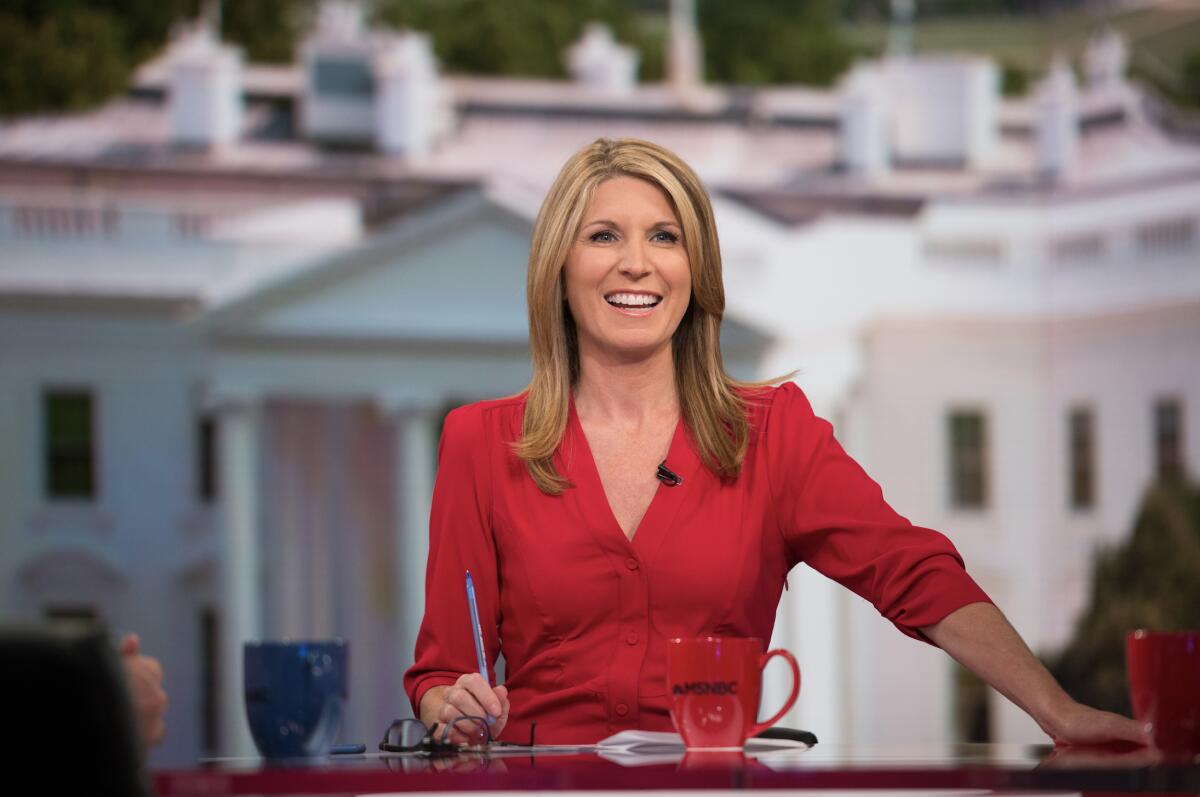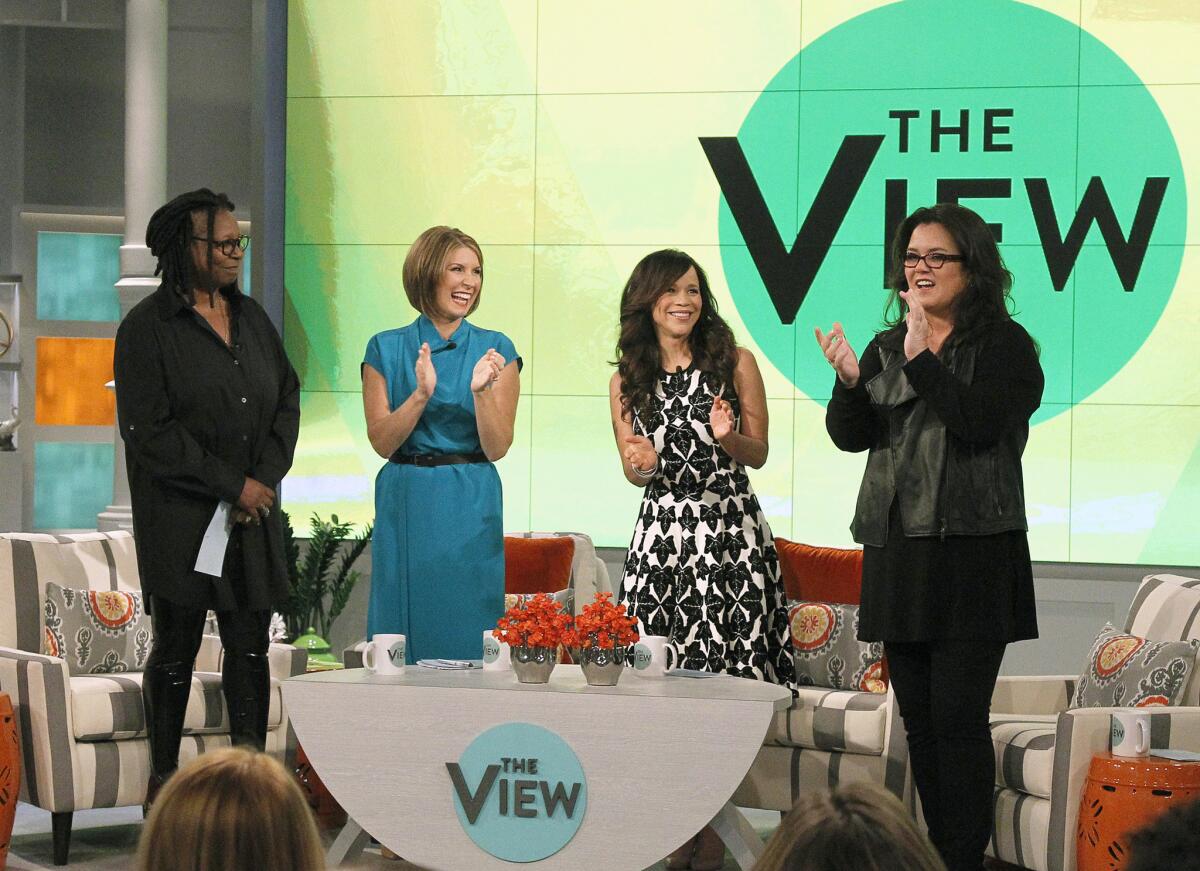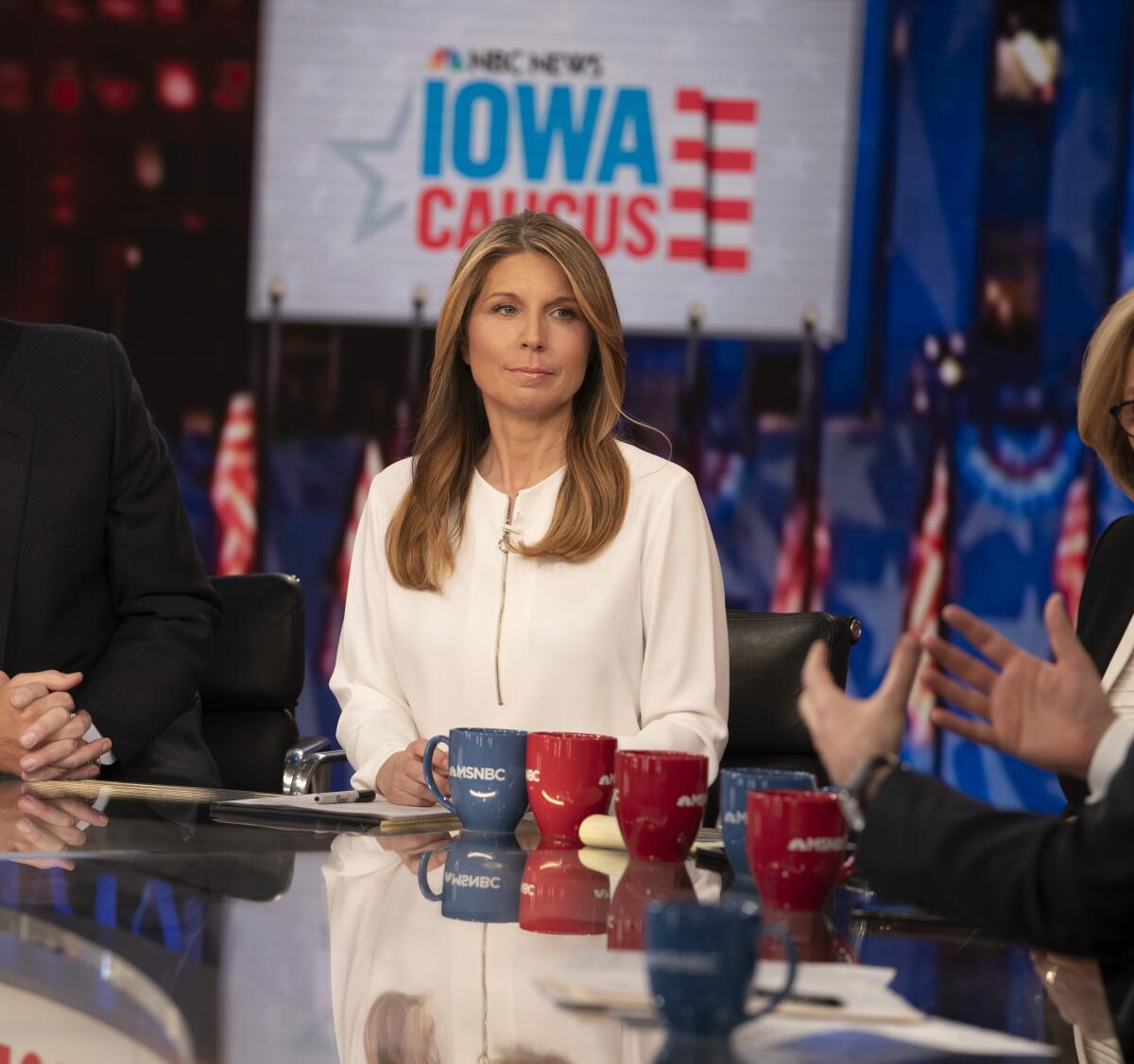Nicolle Wallace won’t just be a never-Trumper as her role expands at MSNBC

Many of the hours on cable news channel MSNBC are a campfire meeting for progressive politics. But Nicolle Wallace — the network’s rising star whose daily program, “Deadline: White House,” expands to two hours (from1 to 3 p.m. Pacific) on Monday — made her bones across the political tracks.
She was communications director for former President George W. Bush and an advisor to 2008 Republican presidential candidate John McCain.
Her transition from politics to punditry to anchoring wasn’t completely smooth. In 2015, she was unceremoniously cut from her role as the Republican at the table on ABC’s daytime chat show “The View,” although she still has fans on the set.
“The only thing better than one hour with Nicolle Wallace is two — it just makes you smarter,” “The View” co-host Whoopi Goldberg said in an email to The Times.
Joy Reid will take over the slot vacated by Chris Matthews’ ‘Hardball.’ She becomes the first Black woman to anchor an evening cable news show.
Since joining NBC as a contributor in 2015, Wallace, 48, has used her deep well of Washington contacts to offer an insider’s perspective and reaction to the turbulent and unpredictable Trump presidency.
“She brings a lot of credibility because she’s not hyper-partisan, and viewers respond to that,” said Katie Couric, who during her stint as anchor of the “CBS Evening News” featured Wallace as a Republican analyst. “She brings a different perspective to the MSNBC lineup.”
Wallace, a native of Orinda, Calif., spoke to The Times from her Connecticut home, where she was preparing to help anchor two weeks of MSNBC’s prime-time coverage of the Democratic and Republican nominating conventions, which begins Monday at 5 p.m. Pacific.
You’re perceived as a “never-Trumper” Republican. If former Vice President Joe Biden takes over the White House, what will your positioning be?
I just never think of myself in any one way. If the story on the front page of the paper is all about the intelligence community, I call the people that I knew in the intelligence community and have them explain the stories to me. If the story is about a terrorist attack, I call the people that worked in counter-terror when I was in the government and ask them to explain what it is that we don’t know.
So I just never think of myself as, ‘How am I going to cover this story as a never-Trumper?’ I said on television in 2015 that I was never going to be a voter available to Donald Trump because of what he said when he came down the escalator, and what he said about John McCain. But I covered him. I still call people working on the campaign and try to cover him. So I guess my answer is: I don’t wake up every day and say, ‘What does the news look like for a never-Trump Republican?’
I try to remember when these stories were written about my administration. And I think most of my sources, because of the nature of the presidency in which I worked, are former national security officials. But I never kind of sit on TV and try to just talk about the world from the viewpoint of a former Bush or McCain Republican, ever. And I wouldn’t obviously as someone covering the Biden administration.
You were working for Gov. Jeb Bush during the Florida recount that followed the 2000 election. Are you prepared for a similar scenario this November?
I think that Trump has cast so much doubt around the legitimacy of an election that hasn’t happened yet that I certainly hope for the best, still; but I think all campaigns and all news organizations should prepare for something that looks more like 2000.
We could have six Floridas.
I think we could. I hope we don’t. And if we do I hope it’s for the noble purpose of sort of affirming people’s belief in the legitimacy of it. It’s ominous is what I’ll say about all the questions that Trump has raised about an election that hasn’t happened.

During John McCain’s 2008 campaign, you advised his running mate Sarah Palin, who put out a congratulatory post offering some guidance for Biden’s vice presidential choice Kamala Harris, including, “Out of the chute trust no one new” and “Fight mightily to keep your own team with you.”
That actually is pretty insightful. I mean, she meant to pour more gasoline on what she views as her grievances about the [2008] campaign. That speaks to Palin’s paranoia, which is fascinating and still intact. But there’s probably some kernel of good advice in there. I think no one knows what it’s like to suddenly be thrust under the klieg lights like Palin was ... . Now, Kamala Harris is a totally different kind of candidate than Sarah Palin. She’s not paranoid or angry. She’s different in every single way. But there’s probably some kernel of wisdom in sort of keeping your own people around you.
President Trump tries to keep making an issue out of presumptive Democratic nominee Joe Biden’s mental capacity. You’ve interviewed Joe Biden. How do you grade his cognitive skills?
I’m no one’s judge and I’m no one’s jury anymore. And I think anyone that has anyone in their life with any sort of disease that requires any of the [cognitive] tests that Trump has turned into another gross political piñata will render their own judgments of Trump for elevating the issue. And I think they’ll be harsh.
So you liked working on “The View.”
I loved it. I loved it.
That’s surprising because it feels like there is such a disconnect from your current show, which is a pretty calm forum.
So did ABC, by the way.
Is a show that’s as contentious as “The View” really helpful for political discourse?
Well, I think the problem was it wasn’t contentious that season I was on. Being fired from a TV show where you think you’re kind of baring your soul feels personal because it is. It’s like being broken up with. Because I never worked in entertainment I think what I didn’t understand is: It really was a casting, and it was a casting they didn’t like.
I sought to make peace with Rosie O’Donnell and Rosie Perez [then co-hosts on “The View”]. I had such a special friendship with Whoopi Goldberg — the first human being who I have ever heard say out loud, in the summer of 2015 — “[Trump] is going to be a president, guys.” I remember whipping my head around and looking at her.
What’s your first memory of presidential politics?
On a family camping trip. My dad had a blue-and-white Dodge van, and my parents were talking about inflation under Jimmy Carter. It wasn’t formative in an ideological way. But it was just sort of the first experience of listening to my parents talk about how the person that was president affected them. My dad was a sole proprietor, a small-business owner, an antique dealer.
I grew up in earthquake country, and so he always lived at the epicenter of whatever was happening in the economy. He didn’t work for a company that could sort of ride out the waves and the ups and downs. He felt the impact of whether people felt like they had more money to spend. If they did, they bought more antique furniture; if they didn’t, they didn’t buy any. And there was a lot of awareness of the real economy from my childhood.
You were portrayed in “Game Change,” the HBO movie about the 2008 election, and you’ve written three politically themed novels. Do you have a favorite movie about politics?
“Dave” is my favorite. That scene in “Dave” where they’re sitting around trying to figure out the budget, and Dave looks at all the Cabinet secretaries. He’s, like, “Hey, Mr. Agriculture Secretary, could you cut $100 million?” He’s, like, “Sure.” I mean, there’s, like, this common-sense approach that the movie “Dave” applies to the presidency that too few presidents apply to the presidency.
And so I used to love to trot out lines from “Dave.” And then “The American President,” where, I think I’ve quoted just about every line back to just about everybody I’ve ever worked for in politics, my favorite being, “So you’re going to pass a crime bill that has no chance of stopping crime?” I’ve also watched every season of “The West Wing” too many times to want to put on the record.

You have an 8-year-old son and you’ve been broadcasting from your home during the pandemic. What has that been like?
He is amazing. So school is sort of from 7 to 1 or 2. And then he has a remote tutor, and his dad lives in the same town in Connecticut where we’re all riding out the pandemic. Everyone is rowing together to make sure that his life is as unchanged as possible. But he’s not unaware of what he’s living through.
I would think going forward there will be some quality video game time between 4 p.m. and 6 p.m.
Yeah, I will acknowledge that “Minecraft” is played. Is that the passive way to say it? “ ‘Minecraft’ is played.”
More to Read
Inside the business of entertainment
The Wide Shot brings you news, analysis and insights on everything from streaming wars to production — and what it all means for the future.
You may occasionally receive promotional content from the Los Angeles Times.











